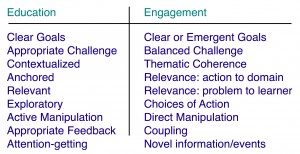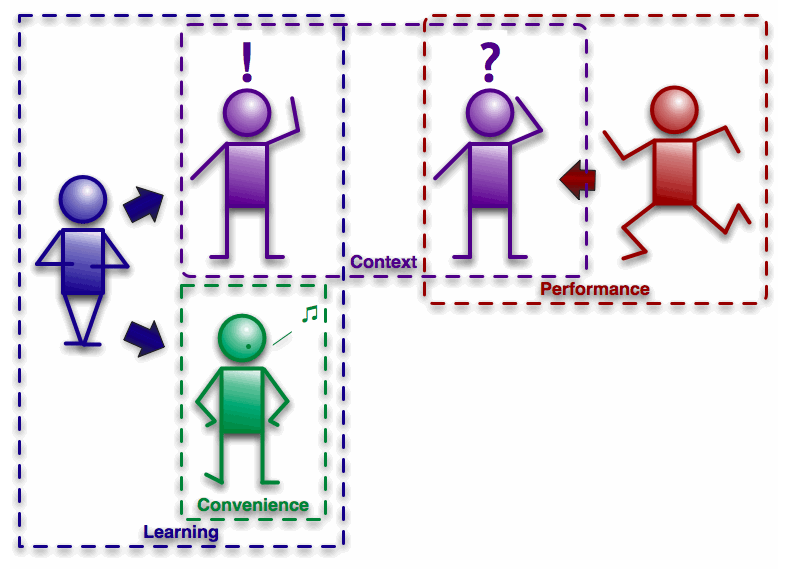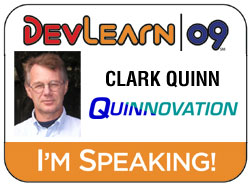How do you systematically design learning experiences that effectively engage the learner?
This was the question I set out to address more than 5 years ago. Based upon years of deep investigation into learning & instruction theories and design processes, and practical experience in designing games, I wrote Engaging Learning: Designing e-Learning Simulation Games.
The book was based upon work I’d published as an academic, but was focused very pragmatically. There were already a few books out about the value of computer games to support learning, notably Marc Prensky’s prescient Digital Game-Based Learning, and Clark Aldrich’s Games and the Future of Learning was also already out. Subsequently, books by Gee, Shaffer, and others have highlighted the opportunities.
However, I thought and think that my book had a unique contribution, being quite specific around:
- the principles that underpin why games are the best learning
- how to modify your design processes to successfully design games
Having looked at the books out there, I still feel it does the best job of making the case.
 At core was an alignment between what makes effective learning practice, and what makes engaging experiences. Looking across educational theories, repeated elements emerge. Similarly with experience design. It turns that they perfectly align. If you recognize that, and can execute against it, your learning will be greater than the sum of the parts, and will both seriously engage and truly educate. Learning can, and should, be hard fun!
At core was an alignment between what makes effective learning practice, and what makes engaging experiences. Looking across educational theories, repeated elements emerge. Similarly with experience design. It turns that they perfectly align. If you recognize that, and can execute against it, your learning will be greater than the sum of the parts, and will both seriously engage and truly educate. Learning can, and should, be hard fun!
The workshops I’ve run based upon the book have been very well received, reinforcing the value of the book. Similarly, the content has been solicited as a component of both Silberman’s Handbook of Experiential Learning, and the Guild’s Immersive Learning Simulation report. I’ve now heard Tony O’Driscoll talk about the design principles for learning experiences in Virtual Worlds (in his and Karl Kapp’s coming book on the topic), and they’re the same principles!
So why hasn’t the book penetrated corporate learning more than it has? There are several contributing factors. First, the work I published as an academic didn’t hit the mainstream. I was part of the international society on computers, and a member of the group specifically about learning through computers (IFIP WG 3.3). They’d just started their own journal, and I wanted to support it (and get a publication). In retrospect, it would’ve been better to publish in one of the more recognized journals on the topic. As I was overseas, the work never hit the US academic awareness.
Second, I didn’t really understand book marketing then, and trusted that the publisher did. At the time, they weren’t very pro-active in developing a joint understanding of responsibility (that’s changed), and my book fell through their cracks (and I’m not a marketing person). (Still, I’m going to be a bit more proactive on the mobile learning book, and they have promised likewise.)
I still firmly believe that the book is the best guide to designing meaningful learning experiences that are centered on deep practice, and a guide for everything from better multiple choice questions to full on simulation-driven serious games. I’ve tracked the rest of the books out there, and they do a good job of arguing why games are a powerful learning environment, why they make business sense, and more. However, Engaging Learning is still the best book out there that tells designers how to go about making them. Sure, I recommend having the workshop to actually get a chance to practice the skills (you know, get your whole team to lift their game), but many who have read it have told me they found value in the book on it’s own.
I don’t say this to generate sales; I get so little it’s not going to make a difference. I say this because I really worked hard to ensure there is a lot of value in it for you. I’m just trying to make sure there’s better learning out there, and there’s a lot more need than I can service individually. There are other good books, Michael Allen’s Guide to eLearning being one, but my book focuses specifically on helping you make more meaningful practice, and that’s a big area of needed improvement, and a major opportunity in making your learning more meaningful.
Please, wherever you draw inspiration, however you figure it out, make more engaging learning. Align the elements of effective practice and the elements of engaging experiences, and make your learning rock. For your learners’ sake, please!
 I’ve argued before that mobile is not really about learning, but about performance support. That said, there are roles for mobile in courses, either as a learning augment or even microcourses (but not putting a whole elearning course on a mobile device). In talking about mobile, I distinguish between convenience and context.
I’ve argued before that mobile is not really about learning, but about performance support. That said, there are roles for mobile in courses, either as a learning augment or even microcourses (but not putting a whole elearning course on a mobile device). In talking about mobile, I distinguish between convenience and context.

 Based on the principles from our CLO
Based on the principles from our CLO